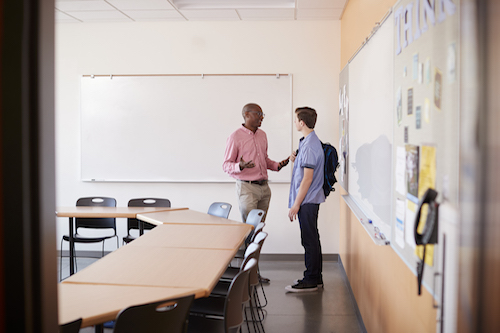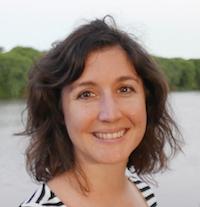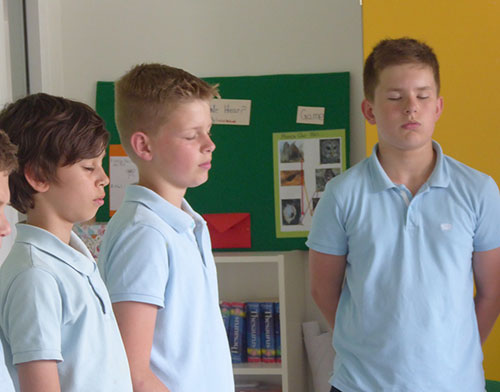Below you will find a selection of the most recent entries from bloggers in our Education section.
To view the entries from individual bloggers, click on the links below:
- Local Teacher Bloggers
Instead of asking teachers or staff from one particular school in the area, we've decided to host all of them under one heading. We expect great things to happen on this page, so make sure to check often to read their stories, insights, explanations, and thoughts on education for children, adults, special needs, or extra-curricular.
- Philippa Dobree-Carey is an adept project manager for an international organization in Geneva. Author of the award-winning student guide "From High School to Uni", Philippa successfully steers students step-by-step through the process of packing, preparing for and thriving in the university environment. This firsthand perspective has driven her to create a library of well-defined, pragmatic resources aimed at facilitating the transition to university life. Discover a treasure trove of invaluable resources by visiting her website www.fromhighschooltouni.com.
- Sabine Hutcheson
Sabine Hutcheson is an education professional with over twenty-five years’ experience in teaching and leadership in schools in Switzerland, the UK and neighbouring France. Sabine has worked as a Teacher, Education Consultant, University and Careers Advisor and, in the past eight years, has held senior leadership positions in schools in Geneva. She is currently the Head of Secondary Admissions at Geneva English School.
- Trudi Hayes
She is the Director of Swiss Language Group in Geneva, which comprises of three schools. Wall Street English, Swiss French School and Ecole Suisse d’Allemand. Trudi has a background in client relationship and service management and is a qualified English teacher. She and her team of language consultants help students find the best language courses for them, according to their individual objectives and requirements.
- Sandra Steiger
TutorsPlus Academic support manager, Sandra and has over 10 years’ experience teaching English at various schools in Switzerland. During her 6 years at the International School of Geneva, she was also the Service Learning programme Coordinator, Homeroom Mentor and Head of Year 8. Now she helps parents and students get the academic support they need.
- Sarah Frei
Head of Marketing and Communication at Brillantmont International School, Sarah is excited by the opportunities created by technology not only to communicate with the multicultural, far-flung school community but also to share knowledge and experiences about educational practice.

By Trudi Hayes, Swiss Language Centre
We are super happy to have Trudi Hayes as one of our new bloggers. To get her started, she has introduced the company she is working for and her blogs will be centered around Languages and Learning.
Why learning a new language is a necessity
The current pandemic has nudged people to research and try out new activities to ‘mentally escape’ the day-to-day monotony we can sometimes feel during these restrictive covid times.
It has given some people the chance to finally tackle lifelong goals or has made others recognize the value in growing and improving themselves, and in giving themselves new opportunities that will help them succeed both during and after these times of uncertainty.
One of the most popular activities has been learning a new language, with mobile apps reporting huge increases in users, and schools dealing with unprecedented demand.
But why would language lessons suddenly become so important?
It basically comes down to the fact that being able to converse in and understand a foreign language helps in both your personal and professional development.
As Manager of a Swiss Language Centre in Geneva (Ecole Suisse d’Allemand, Swiss French School and Wall Street English), I have seen large numbers of students who are now “reinventing” themselves.
They are reconsidering (by choice or by force) their professional or academic plans and they understand now just how important mastering a new language can be.

By Sandra Steiger, Academic Support Manager, TutorsPlus
How do you deal with teacher-related issues in a sensitive way, helping you achieve a positive outcome without making matters worse? When it comes to matters concerning your child, it can be hard to restrain yourself from running at the teacher like a charging bull. Have you ever been in that situation?
Comments that I hear regularly:
- “the teacher is not marking my daughter’s homework often enough”
- “the school doesn’t push my children to achieve more”
- “my child hates their teacher this year”
- “the school just doesn’t care”
I’m right in the middle of the issue as I represent both teacher and student when I talk to parents. I can see both sides of the argument. The funny thing is that both the parents and the teachers are right. It’s tough for schools to satisfy each individual student’s needs and every parent’s desires. But that isn’t to say there isn’t a lot you can do to get your voice heard and improve the situation for your child. And if your concern is proactive and constructive, there’s little reason for the school not to be receptive.
Below are some simple steps that will help get your problem sorted or at least improved. After all your child, and perhaps their siblings too, are likely to be at the same school for a number of years. So, beware of letting emotion take over, keep a cool head and avoid a situation that could make school life difficult in the future for you or your children. The school-parent-child relationship, like any relationship, needs nurturing and respect to be a positive one for all involved.

1. Make sure your complaint is fair
All complaints are fair to a degree, as it is certainly true that if your child is unhappy then you have every reason to contact the school and seek a change. But 9 times out of 10 the problem is more complex than at first glance. Take a child who had taken a sudden dislike to French saying the teacher was always shouting at the students. Upon further investigation it became clear that the student was repeatedly drawing in the lesson and not concentrating on the work in hand. To avoid misunderstanding on either side, do a little digging and don’t always take your child’s point of view as absolute.
2. Make the request into a question
It is just human nature that a question is often easier to receive than a statement, demand, or accusation. So, phrase your concern as a question. After all, parents are not teachers and there might be a good pedagogical reason behind what you don’t like at school. Think about a problem with your electricity. Would your opening conversation with the electrician start with a detailed request outlining exactly how they should fix your fuse box? Usually not, so best to apply the same approach to solving any problems at school.
3. Explain the problem, don’t blame the person
This forms the basics of healthy communication. Focus on what you see as the problem, what consequences it is having for your child or your family that the teacher and school might not be aware of. As already mentioned above – your child’s perspective on the situation is not the only one. The default reaction to blaming can often be defensiveness and this is not a good foundation for finding a constructive solution. If a particular teacher’s approach is not working for your family or your child, most teachers would want to know and keenly investigate a way forward. With a little thought an experienced teacher will find a way to make the situation better.
4. Brainstorm some suggestions to offer
Think of ways, perhaps with your child, that the situation could be improved. Focus particularly on actions and approaches that you and your child could take to move towards a solution. These can be suggested in your communication with the school. It shows the school that you are on side and working positively to try to make it happen. Often you will find that there are a whole range of things that can be done to help and sometimes it will take time to work through a number of options until the situation is resolved.
5. Be open to new ideas and solutions
While it is good and even essential to have your own ideas to improve things, you do need to be open to the school’s solutions too. They have to manage a whole class, year group and even school. So, the solution your child needs has to be amenable to the community. This means you will need to keep an open mind to solutions you may not have thought of yet. Also, teachers often have quite a balanced view of your child. They are present to observe how your child reacts to adversity, feedback, pressure and their peers on a daily basis. So, it’s important to build a complete picture and accept that the solution coming from the school is going to be just as or even more appropriate than the one us parents would come up with on our own.
6. Work on the basis that the teacher and school want the best for your child
We’ve had so many conversations with parents who feel that any difficulties between a teacher and student is personal, and perhaps it is on occasion. However, if it has reached that point, it has usually developed over a long period of time of not addressing the issue, or not addressing it well. Generally speaking, teachers are professionals who are not setting out to make life difficult for your child. It really makes their day so much easier and enjoyable to have good relationships with their students. So, try your best to believe that the school does want the best for your child, even if sometimes you feel this is not the case. At the very least, this attitude will help you enter into conversations with the school from a positive standpoint, which will make the communication run smoother.
7. Avoid going above the person directly involved
Address your concerns to the person who it involves directly, usually the class teacher. Teachers are expected to attempt to resolve issues first before a higher level of management gets involved. So, it can be very uncomfortable and confusing for a teacher to get the first round of feedback and critique from their Head of Department or the Principal. While it might be tempting to go straight to the top, in an attempt to give more importance to the situation, this can backfire leading to a break in trust and in the schools mechanisms. If you feel the need to get a higher level of management involved it is often best to write to the class teacher and ask them to involve the principal. Then if you find this doesn’t happen, follow up with an email to the head copying in the teacher in question.
8. Be reasonable and polite
Sleep on your email, re-write the next day if necessary. It is sometimes easier to say than do, especially when problems concern our children feel urgent and emotions can run high. But staying calm and politely communicating with the school is essential. We have worked as mediators for parents when the school/family relationship has entirely broken down. This is sad and difficult for all involved and it also makes the problems much harder to solve. This also means avoiding speaking negatively about a school or teacher in front of your children. This can quickly snowball and will affect your child’s behaviour in school negatively. And if you are in fact mistaken about the source of the problem, these negative comments can have enduring unfair consequences for the teacher and the school.
Keeping these 8 tips in mind when resolving a problem with your child’s school will get a faster solution in place, probably a better one and also have the benefit of forging a stronger and constructive relationship between your family and the community of the school.
Author's bio
 Sandra Steiger is the TutorsPlus Academic support manager and has over 10 years’ experience teaching English at various schools in Switzerland. During her 6 years at the International School of Geneva, she was also the Service Learning programme Coordinator, Homeroom Mentor and Head of Year 8. Now she helps parents and students get the academic support they need.
Sandra Steiger is the TutorsPlus Academic support manager and has over 10 years’ experience teaching English at various schools in Switzerland. During her 6 years at the International School of Geneva, she was also the Service Learning programme Coordinator, Homeroom Mentor and Head of Year 8. Now she helps parents and students get the academic support they need.

By Sabine Hutcheson, Head of Sixth Form, British School of Geneva
In a region where we are spoilt for choice in post-secondary education, A-Levels stand out as the true alternative. Recognised as a ticket to universities internationally, the A-Levels programme is very different to other diplomas in its structure and in the way it prepares students for higher education.
Structure and ethos of the diploma
Students taking A-Levels are typically 16 to 18 years of age and the programme is two years long. In the UK, this stage of education is referred to as the Sixth Form. It immediately follows the General Certificate of Secondary Education (GCSE) in the UK, obtained at the age of 16 and marking the end of compulsory education.
In the first year (Year 12), students study 4 subjects for which they are examined in May and June of that academic year. In their second and final year (Year 13), students tend to drop a subject and pursue the 3 with which they feel most comfortable and/or which better fit their chosen university course admission criteria. Some students choose to maintain all 4 subjects to add to the challenge or to keep their options open. A subject taken in Year 12 only will be validated as an AS Level (Advanced Subsidiary Level) and may count towards university applications.

By Sabine Hutcheson, Head of Sixth Form, British School of Geneva
In a region where we are spoilt for choice in post-secondary education, A-Levels stand out as the true alternative. Recognised as a ticket to universities internationally, the A-Levels programme is very different to other diplomas in its structure and in the way it prepares students for higher education.
Structure and ethos of the diploma
Students taking A-Levels are typically 16 to 18 years of age and the programme is two years long. In the UK, this stage of education is referred to as the Sixth Form. It immediately follows the General Certificate of Secondary Education (GCSE) in the UK, obtained at the age of 16 and marking the end of compulsory education.
In the first year (Year 12), students study 4 subjects for which they are examined in May and June of that academic year. In their second and final year (Year 13), students tend to drop a subject and pursue the 3 with which they feel most comfortable and/or which better fit their chosen university course admission criteria. Some students choose to maintain all 4 subjects to add to the challenge or to keep their options open. A subject taken in Year 12 only will be validated as an AS Level (Advanced Subsidiary Level) and may count towards university applications.

By Michela Mantani, La Côte International School
Across the globe, one of the hottest topics in education at the moment is whether we should be teaching our children how to manage their emotional state and be in charge of their own wellbeing. In Asia meditation classes are on the rise to help students cope with stress levels and develop emotional resilience, while in Great Britain recent statistics have shown that an average of 3 children per classroom have mental health issues ranging from anxiety to burn-out, which may lead to low-level disruption.
As our youngsters lead increasingly stressful, over-planned lives, screen time and excessive stimulation have also been linked to the rise of mental disorders in children. The burning question on every educator’s mind at the moment is, without a doubt: “What can our schools do to help students regulate their emotions and improve their daily interactions with others?”
In recent years, a growing number of scientific studies have underlined the benefits of mindfulness exercises for students, based on solid evidence relating to the impact of mindfulness on adults, as well as encouraging indications on the positive impact that a regular practice of meditation and breathing techniques can have on children and young people.





